Sheffield University Native Speaker’s Perception of American English as a Global Language
Added on 2023-06-14
22 Pages5291 Words300 Views
1
SHEFFIELD UNIVERSITY NATIVE SPEAKER’S PERCEPTION OF THE AMERICAN
ENGLISH AS A GLOBAL LANGUAGE
SHEFFIELD UNIVERSITY NATIVE SPEAKER’S PERCEPTION OF THE AMERICAN
ENGLISH AS A GLOBAL LANGUAGE
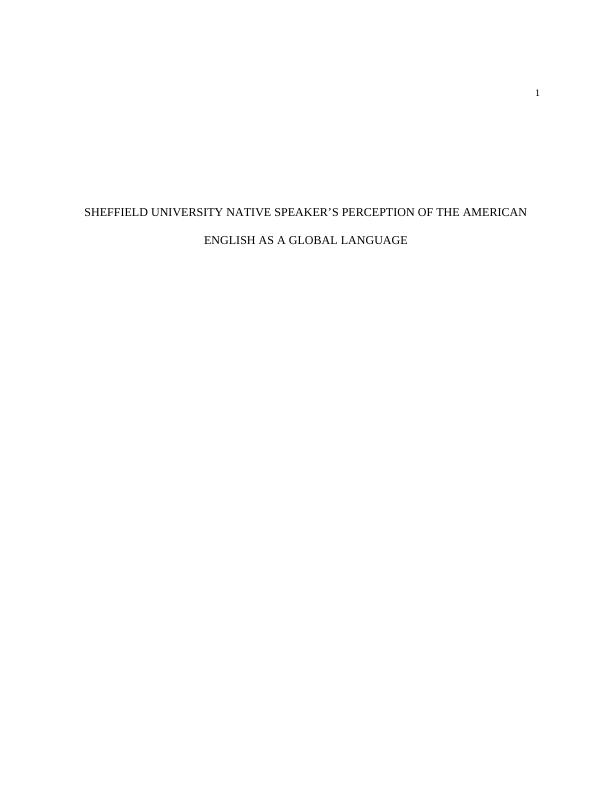
2
Introduction
English as Lingua Franca Language (EFL) has opportunities and challenges for students in
native speaking countries. This depends on the functional context or perspective of the
language. This discussion looks at the use of English as a native language (ENL) and how it
continues to motivate students to take advantage of its adoption as a global language. With
numerous versions of English including the British and American English, it raises various
research questions about student’s perception of its variations (Crystal, 2013). This depends on
their region or origin as some students regard English as a uniform language (Clark, 2014).
English as lingua franca is useful to both native and native speakers but variations in its spoken
and written forms raise questions about its adoption as an international language (Copland,
Garton & Burns, 2014). The variation in English means that teachers apply strategic
instructional competencies for effectiveness in using English as a standard language. This raises
questions about the best model for the global environment. Learners experience cultural
difficulties when adopting English as a main language hence the need to understand the right
standard for English language in terms of pronunciations and grammatical structures
(Mackenzie, 2015).
Background
Research investigating the use of Englishes across the globe includes the perception of native
speakers about the status of English as a foreign language (Chun, 2016). Learners in an English
class in the UK and US appreciate its use in different subjects and as a global communication
Introduction
English as Lingua Franca Language (EFL) has opportunities and challenges for students in
native speaking countries. This depends on the functional context or perspective of the
language. This discussion looks at the use of English as a native language (ENL) and how it
continues to motivate students to take advantage of its adoption as a global language. With
numerous versions of English including the British and American English, it raises various
research questions about student’s perception of its variations (Crystal, 2013). This depends on
their region or origin as some students regard English as a uniform language (Clark, 2014).
English as lingua franca is useful to both native and native speakers but variations in its spoken
and written forms raise questions about its adoption as an international language (Copland,
Garton & Burns, 2014). The variation in English means that teachers apply strategic
instructional competencies for effectiveness in using English as a standard language. This raises
questions about the best model for the global environment. Learners experience cultural
difficulties when adopting English as a main language hence the need to understand the right
standard for English language in terms of pronunciations and grammatical structures
(Mackenzie, 2015).
Background
Research investigating the use of Englishes across the globe includes the perception of native
speakers about the status of English as a foreign language (Chun, 2016). Learners in an English
class in the UK and US appreciate its use in different subjects and as a global communication
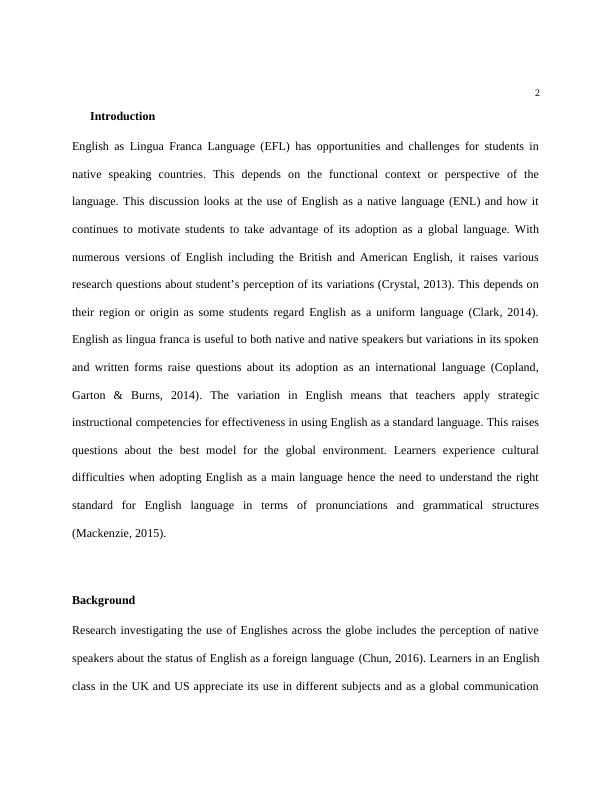
3
tool. As a result, researchers continue to study ENL and how it shapes learners identity. Norton
(2013) presents an article on the sociological aspect of language to note that the geographical
spread of English in the international environment affects social interaction and presents
opportunities for polished speakers. However, English standards vary raising concerns about
student’s mastery, competency, beliefs and identity. Language functions include communication
and professional development. Globalization presents challenges and opportunities for students
in English native lands. This includes the social influences of English as a core subject in
international studies including its ideologies and its evolution in a multicultural environment
(Kirkpatrick, World Englishes, 2014) This explains why ENS strives to attain competencies in
English for opportunities in the global community. Its economic benefits may also become a
challenge due to the geographical variations of English as a global language (Neeley, 2013).
This study focuses on the native students from Sheffield and their perception of English, its use
as an emerging language and the existing psychosocial and linguistic challenges.
Purpose of the study
The study seeks to collect data from a survey in order to understand the native speaker’s
perception of Englishes. Jones, Baxter and Khadija (2013) support this research because it
yields meaningful results for global language studies. This study is an addition to quantitative
and qualitative study of English as a global language (Kirkpatrick, World Englishes, 2014). The
target population is a group of English native students at the college level. It features an
experiment on the perception of proficient students on native English standards, cultural
affiliation and reasons for using English for professional development. The study also explores
areas in which English standards are dominant such as in technology and how this shapes its
tool. As a result, researchers continue to study ENL and how it shapes learners identity. Norton
(2013) presents an article on the sociological aspect of language to note that the geographical
spread of English in the international environment affects social interaction and presents
opportunities for polished speakers. However, English standards vary raising concerns about
student’s mastery, competency, beliefs and identity. Language functions include communication
and professional development. Globalization presents challenges and opportunities for students
in English native lands. This includes the social influences of English as a core subject in
international studies including its ideologies and its evolution in a multicultural environment
(Kirkpatrick, World Englishes, 2014) This explains why ENS strives to attain competencies in
English for opportunities in the global community. Its economic benefits may also become a
challenge due to the geographical variations of English as a global language (Neeley, 2013).
This study focuses on the native students from Sheffield and their perception of English, its use
as an emerging language and the existing psychosocial and linguistic challenges.
Purpose of the study
The study seeks to collect data from a survey in order to understand the native speaker’s
perception of Englishes. Jones, Baxter and Khadija (2013) support this research because it
yields meaningful results for global language studies. This study is an addition to quantitative
and qualitative study of English as a global language (Kirkpatrick, World Englishes, 2014). The
target population is a group of English native students at the college level. It features an
experiment on the perception of proficient students on native English standards, cultural
affiliation and reasons for using English for professional development. The study also explores
areas in which English standards are dominant such as in technology and how this shapes its
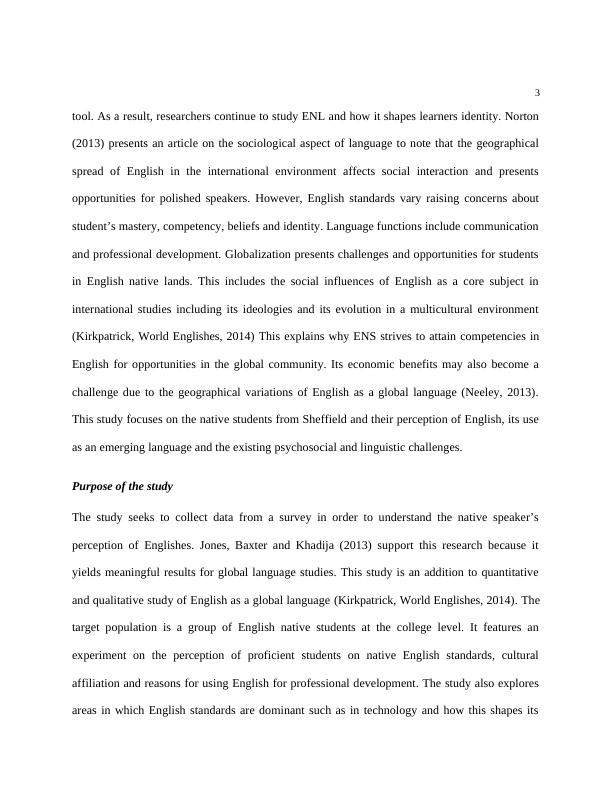
4
adoption as ELF. It highlights the role of teachers in developing language competencies in the
global environment. Language practices in the contemporary society also emerge with social
media and technology communication emerging as a new area for research in EIL. This study
explains why variations in the UK and US Standard English affects its application in the
corporate world creating challenges on the most popular version for use in the business world.
Research Questions
This discussion aligns the English language with the global contexts and learners perception. It
answers the following question:
What perception do native learners in college have of English and its variations?
How does this perception influence their acceptance of English as a global language?
What effect does global communication have on native students?
What is the role of technology and the international environment in shaping EIL?
What factors contribute to the students' attitude of world Englishes?
Theoretical Background
Crystal (2012) considers English as a global language based on its history, current
developments and future expectations. This explains the student’s perception of the language as
an international language. Critical issues emerging include its commercial role and cultural
perspective (Neeley, 2012: Smith, 2015:Fisher, 2015).
adoption as ELF. It highlights the role of teachers in developing language competencies in the
global environment. Language practices in the contemporary society also emerge with social
media and technology communication emerging as a new area for research in EIL. This study
explains why variations in the UK and US Standard English affects its application in the
corporate world creating challenges on the most popular version for use in the business world.
Research Questions
This discussion aligns the English language with the global contexts and learners perception. It
answers the following question:
What perception do native learners in college have of English and its variations?
How does this perception influence their acceptance of English as a global language?
What effect does global communication have on native students?
What is the role of technology and the international environment in shaping EIL?
What factors contribute to the students' attitude of world Englishes?
Theoretical Background
Crystal (2012) considers English as a global language based on its history, current
developments and future expectations. This explains the student’s perception of the language as
an international language. Critical issues emerging include its commercial role and cultural
perspective (Neeley, 2012: Smith, 2015:Fisher, 2015).
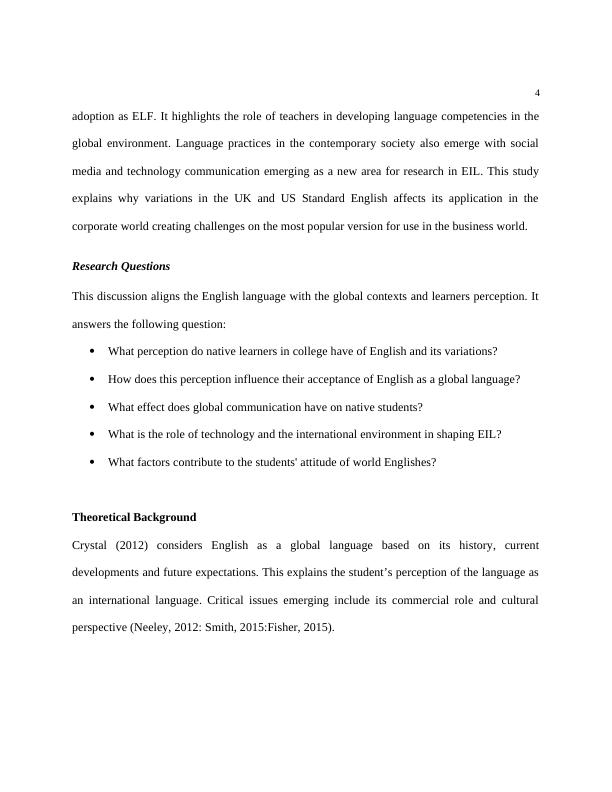
5
Natives Learning English
The adoption of English as lingua franca is due to various reasons. Global learning institutions
like Sheffield University have made Educational policy changes to acknowledge English as an
instruction language in order to accommodate English as a unified global language (Dearden,
2014). Native speakers consider it as a core language with immense opportunities across the
globe. In the corporate world, English is a resource that supports tasks, integration and global
business. Students embrace the language because of its increasing prominence. However the
geographical distribution of English speaking regions presents challenges because of different
versions of the language. Research reveals that native learners have an advantage of operating
in many parts of the world but ELF limits their flexibility in multilingual language
development. (Copland, et al., 2014)
Instructional competence
English as Lingua Franca (ELF) classes have a high demand for competent teachers from native
speaking regions of the world (Genesee & Lindholm-Leary, 2013). Based on their proficiency
in grammar, pragmatism and language contexts, native students from the UK and US look
forward to finding employment in multilingual environments across the globe. However,
English as an international language comes with ideological concepts from its origin. Some
regions prefer the UK versions while others support the US English (Jenkins, 2013). Global
competence is an issue because of the dwindling proficiency of quality English. Native leaners
Natives Learning English
The adoption of English as lingua franca is due to various reasons. Global learning institutions
like Sheffield University have made Educational policy changes to acknowledge English as an
instruction language in order to accommodate English as a unified global language (Dearden,
2014). Native speakers consider it as a core language with immense opportunities across the
globe. In the corporate world, English is a resource that supports tasks, integration and global
business. Students embrace the language because of its increasing prominence. However the
geographical distribution of English speaking regions presents challenges because of different
versions of the language. Research reveals that native learners have an advantage of operating
in many parts of the world but ELF limits their flexibility in multilingual language
development. (Copland, et al., 2014)
Instructional competence
English as Lingua Franca (ELF) classes have a high demand for competent teachers from native
speaking regions of the world (Genesee & Lindholm-Leary, 2013). Based on their proficiency
in grammar, pragmatism and language contexts, native students from the UK and US look
forward to finding employment in multilingual environments across the globe. However,
English as an international language comes with ideological concepts from its origin. Some
regions prefer the UK versions while others support the US English (Jenkins, 2013). Global
competence is an issue because of the dwindling proficiency of quality English. Native leaners
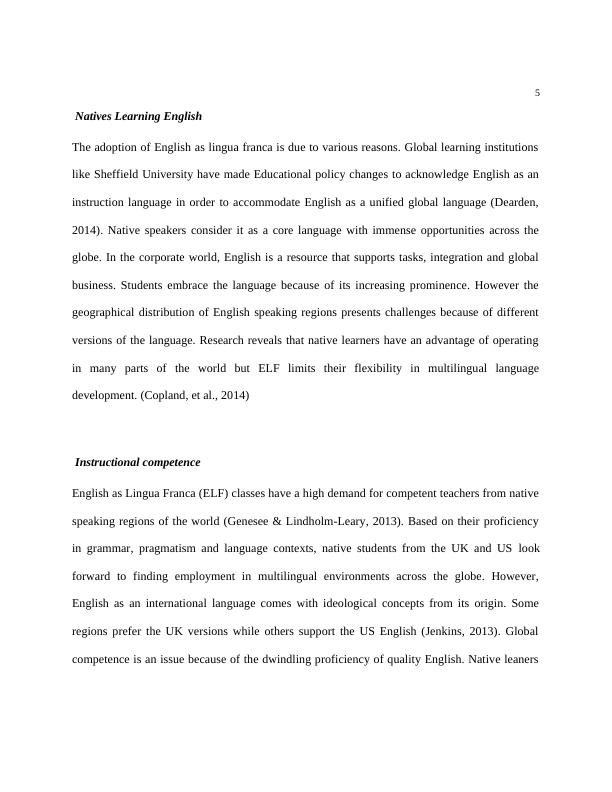
6
have an advantage because they have cognitive as well as academic proficiency (Kinginger,
2015).
Regional Language
Hu (2012) acknowledges the role of English and its expansion across geographical regions to
point out that the native speakers prefer their English. This brings out the role of cultural
diversities and affiliations and the existence of English as lingua franca (Oanh & Walkinshaw,
2014). As a result some regions find it hard to accept native speakers from some regions. For
example, native speakers in Australia and New Zealand prefer the UK English to the US
because of the cultural/historical affiliations. This redefines the English proficiency according
to the regional standards for vocabulary, grammar, context application and pronunciation (Wei
&Yuming, 2015). Consequently the dominant issues concerning English and its spread across
the world emerge. Linguistic imperialism emerges with its use in art and science subjects. As an
interdisciplinary subject it gives more opportunities to the native learners (Gayton, 2016).
Intellectual development
The ability to speak more than one language calls for acceptability of the language, willingness
to communicate and pleasantness of speaking the new language (Science Daily, 2016).the fact
that English has different dialects supports its adoption as a main global language for academic
learning. However, this notion limits the development of other languages. Native English from
UK further has dialects like the Welch and Cornish. In addition, contemporary English includes
have an advantage because they have cognitive as well as academic proficiency (Kinginger,
2015).
Regional Language
Hu (2012) acknowledges the role of English and its expansion across geographical regions to
point out that the native speakers prefer their English. This brings out the role of cultural
diversities and affiliations and the existence of English as lingua franca (Oanh & Walkinshaw,
2014). As a result some regions find it hard to accept native speakers from some regions. For
example, native speakers in Australia and New Zealand prefer the UK English to the US
because of the cultural/historical affiliations. This redefines the English proficiency according
to the regional standards for vocabulary, grammar, context application and pronunciation (Wei
&Yuming, 2015). Consequently the dominant issues concerning English and its spread across
the world emerge. Linguistic imperialism emerges with its use in art and science subjects. As an
interdisciplinary subject it gives more opportunities to the native learners (Gayton, 2016).
Intellectual development
The ability to speak more than one language calls for acceptability of the language, willingness
to communicate and pleasantness of speaking the new language (Science Daily, 2016).the fact
that English has different dialects supports its adoption as a main global language for academic
learning. However, this notion limits the development of other languages. Native English from
UK further has dialects like the Welch and Cornish. In addition, contemporary English includes
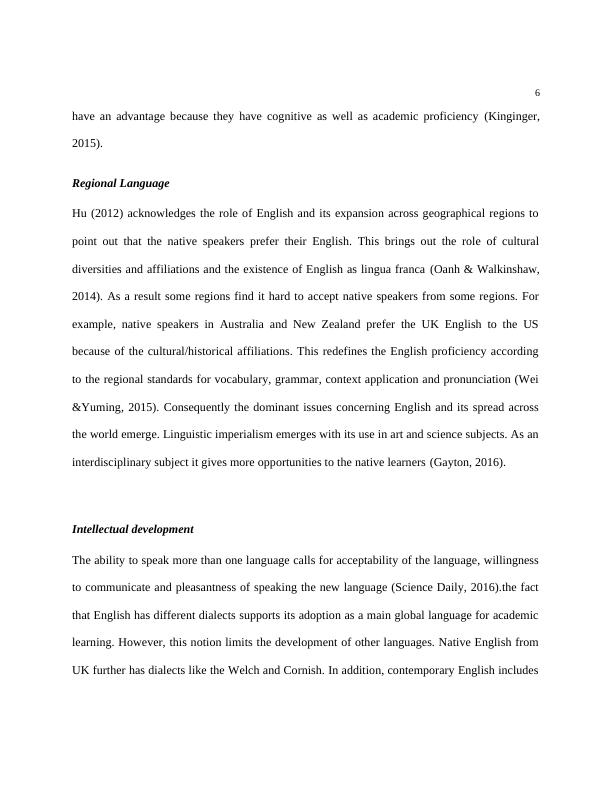
End of preview
Want to access all the pages? Upload your documents or become a member.
Related Documents
English as Lingua Francalg...
|14
|3705
|37
How to learn English quickly:lg...
|19
|4948
|34
Exploring the Role of English in International Business: Language Challenges and Communication Strategieslg...
|5
|1350
|332
Humanity Assignment | Way to Learn English Languagelg...
|23
|4021
|15
Learning English as a Second Language Theory 2022lg...
|11
|3081
|23
ENG123 - Online Business English- New Trendslg...
|5
|694
|193
